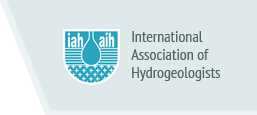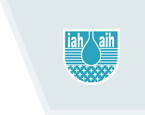Steering Committee
Viviana Re
Director, Italy
Dr. Viviana 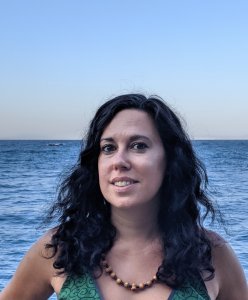 Re is assistant professor at the Department of Earth Sciences, University of Pisa (Italy). She is an Environmental Scientist and does research in hydrogeology, hydrogeochemistry of (ground)water contamination, isotope techniques for monitoring groundwater salinization and geochemical processes occurring in contaminated aquifers. Viviana is also actively involved in Technical Cooperation projects focusing on: development of quality monitoring programs, support to groundwater resource planning, management and protection. She recently developed socio-hydrogeology as a new approach aiming at incorporating the social dimension into hydrogeological investigations. She is author of the Bir al-Nas blog and co-founder of Responsible Water Scientists.
Re is assistant professor at the Department of Earth Sciences, University of Pisa (Italy). She is an Environmental Scientist and does research in hydrogeology, hydrogeochemistry of (ground)water contamination, isotope techniques for monitoring groundwater salinization and geochemical processes occurring in contaminated aquifers. Viviana is also actively involved in Technical Cooperation projects focusing on: development of quality monitoring programs, support to groundwater resource planning, management and protection. She recently developed socio-hydrogeology as a new approach aiming at incorporating the social dimension into hydrogeological investigations. She is author of the Bir al-Nas blog and co-founder of Responsible Water Scientists.
Shrikant Limaye
Co-Director, India
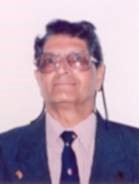 Dr. Shrikant Daji Limaye, B.Engg, M.Tech (Geophysics) and PhD (Hydrogeology), is in the field of groundwater exploration and development for the past over 55 years for promoting small scale irrigation by farmers. He specializes in promoting conjunctive use of surface water and groundwater, recharge augmentation and watershed development. Dr. Limaye received Ibaraki Kasumigaura Prize of 500,000 Yen from Japan for the paper regarding Utility of Percolation Lakes for recharge augmentation, at the Lake-99 Conference in Copenhagen in May 1999. As a consultant to several industries, including mining industry and cement companies, Dr Limaye has been advocating eco-friendly and socio-friendly development of earth resources for human use.
Dr. Shrikant Daji Limaye, B.Engg, M.Tech (Geophysics) and PhD (Hydrogeology), is in the field of groundwater exploration and development for the past over 55 years for promoting small scale irrigation by farmers. He specializes in promoting conjunctive use of surface water and groundwater, recharge augmentation and watershed development. Dr. Limaye received Ibaraki Kasumigaura Prize of 500,000 Yen from Japan for the paper regarding Utility of Percolation Lakes for recharge augmentation, at the Lake-99 Conference in Copenhagen in May 1999. As a consultant to several industries, including mining industry and cement companies, Dr Limaye has been advocating eco-friendly and socio-friendly development of earth resources for human use.
He was elected as President of the Association of Geoscientists for International Development (AGID) for the Term 1996-2000, at the General Body meeting of AGID in Beijing. Dr. Limaye is Project Leader of UNESCO-IUGS-IGCP Project 523: “Ground water network for best practices in ground water management in low-income countries”. Website: http://www.igcp-grownet.org. This is one of the most successful project under IUGS-IGCP umbrella and its website received over 35,000 visits so far. This is Dr Limaye’s contribution to Socio-Hydrogeology (SHG) which aims at taking groundwater science to the society.
Theresa Frommen
Co-Director, Germany
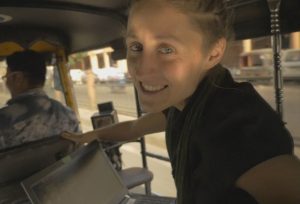 Dr. Theresa Frommen is a hydrogeologist and works at the Hessian State Agency for Nature Conservation, Environment and Geology in Wiesbaden, Germany. She studied geological sciences with a focus on hydrogeology at the Freie Universitaet Berlin, RWTH Aachen and the University of Manchester. After completing her master’s degree, she worked as a research assistant and doctoral candidate in the hydrogeology working group at the Institute of Geological Sciences at the FU Berlin and conducted research on participatory methods in hydrogeology with a focus on India. During her PhD project, she lived and worked in Jaipur, Rajasthan for 1.5 years. She then worked as a post-doc at IRI-THESys, Humboldt-Universitaet zu Berlin, where her research focused on inter- and transdisciplinary collaboration and approaches, science communication and education, and understanding the connection between groundwater and society and why and where conflicts arise.
Dr. Theresa Frommen is a hydrogeologist and works at the Hessian State Agency for Nature Conservation, Environment and Geology in Wiesbaden, Germany. She studied geological sciences with a focus on hydrogeology at the Freie Universitaet Berlin, RWTH Aachen and the University of Manchester. After completing her master’s degree, she worked as a research assistant and doctoral candidate in the hydrogeology working group at the Institute of Geological Sciences at the FU Berlin and conducted research on participatory methods in hydrogeology with a focus on India. During her PhD project, she lived and worked in Jaipur, Rajasthan for 1.5 years. She then worked as a post-doc at IRI-THESys, Humboldt-Universitaet zu Berlin, where her research focused on inter- and transdisciplinary collaboration and approaches, science communication and education, and understanding the connection between groundwater and society and why and where conflicts arise.
Photo: Katalin Ambrus
Bárbara Zambelli
Task Team Leader for Gender and Groundwater, Brazil & Germany
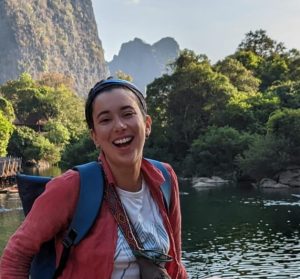 Bárbara Zambelli is a PhD candidate at Pisa University (Italy) doing a socio-hydrogeological assessment of microplastics contamination in groundwater. She holds a M.Sc. in Groundwater Management from the Technische Universität Bergakademie Freiberg (Germany) and B.Sc. in Geological Engineering at Federal University of Ouro Preto (Brazil) and University College Cork (Ireland). In the past few years, she has been involved with different science communications initiatives, being the co-founder of a_Ponte, a platform that aims to bridge geosciences and society, besides writing for Geology for Global Development’s Blog, hosted on EGU website. Bárbara is part of Geoethics organizations both in national and international levels. Also, she is involved in projects regarding gender and groundwater in Brazil (NUCAT/UNESCO), and about the inclusion of marginalised rural communities in Laos and Cambodia through sustainable groundwater access and use (IWMI).
Bárbara Zambelli is a PhD candidate at Pisa University (Italy) doing a socio-hydrogeological assessment of microplastics contamination in groundwater. She holds a M.Sc. in Groundwater Management from the Technische Universität Bergakademie Freiberg (Germany) and B.Sc. in Geological Engineering at Federal University of Ouro Preto (Brazil) and University College Cork (Ireland). In the past few years, she has been involved with different science communications initiatives, being the co-founder of a_Ponte, a platform that aims to bridge geosciences and society, besides writing for Geology for Global Development’s Blog, hosted on EGU website. Bárbara is part of Geoethics organizations both in national and international levels. Also, she is involved in projects regarding gender and groundwater in Brazil (NUCAT/UNESCO), and about the inclusion of marginalised rural communities in Laos and Cambodia through sustainable groundwater access and use (IWMI).



